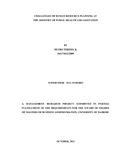| dc.contributor.author | Muoki, Teresia K | |
| dc.date.accessioned | 2013-02-28T11:09:24Z | |
| dc.date.issued | 2012 | |
| dc.identifier.uri | http://erepository.uonbi.ac.ke:8080/xmlui/handle/123456789/12322 | |
| dc.description.abstract | The study aimed at establishing the human resource planning challenges at the Ministry
of Public Health and Sanitation. The objective of the study was to establish the
challenges of human resource planning facing the Ministry. The study was carried out at
the Ministry headquarters using a case study design. The study used purposive sampling to select the respondents who were the ten (10) departmental heads because they are actively involved in policy formulation and implementation and an interview guide used to collect the data and data was analyzed using content analysis.The major challenges mentioned in this study are: The need to automate all the personnel data. In order to ensure qualified staff are attracted and retained in the ministry there is the need for compensation or incentives based on performance. This will help counter the challenge on poor remuneration, allowances and staff de-motivation. Staff distribution in the ministry was cited as inequitable and skewed with urban areas being relatively well staffed while hardship areas are understaffed. The training opportunities in the ministry are adversely affected by limited resource allocation and are not equitably distributed across the cadres. Some of the infrastructure related challenges mentioned were lack of reliable communication structures, inadequate office facilities/space and staff houses in
the majority of the districts. In order to adequately address these challenges there is the
need for the ministry to adopt strategic human resource management.
There were various recommendations made to counter the challenges cited. The HR
processes should be automated for ease of reference and faster decision making. This will ensure effective and efficient HR management. The automated HR data should be
updated regularly. If qualified staff are to be attracted and retained this study
recommends that the ministry improves the schemes of service, emuneration/allowances and other and base promotion on performance. With reference to staff distribution it hereby recommended that the Interagency Coordinating Committee (ICC) be strengthened by involving all the health stakeholders and workload analysis be done to inform staff equitable staff distribution. Hard to access areas should be allocated some allowances to encourage staff to work in such regions. Currently the staffing levels are below the required number. There is therefore the need for workload analysis and subsequent equitable recruitment of the required number of staff. Recommended also is the need for deployment of more HR officers to various departments so that non HR staff concentrate purely on their areas of specialization. The ministry should budget according staff needs in terms of skills development and give them equal training opportunities. The need for a staff training policy is recommended as well the need for training needs assessment and awareness creation on the available training opportunities in the ministry. To counter the infrastructure related challenges there is the need for creation of more office space and adopt open-work stations, construct staff houses especially in the newly created districts, procure relevant medical and office equipment. | en |
| dc.description.sponsorship | The University of Nairobi | en |
| dc.language.iso | en | en |
| dc.subject | Human resource planning | en |
| dc.subject | Ministry of public health and sanitation | en |
| dc.title | Challenges of human resource planning at the ministry of public health and sanitation | en |
| dc.type | Thesis | en |
| local.publisher | School of Business | en |

